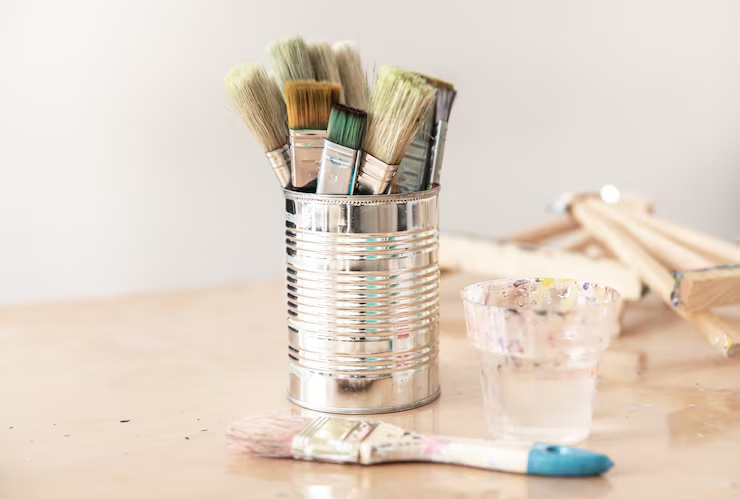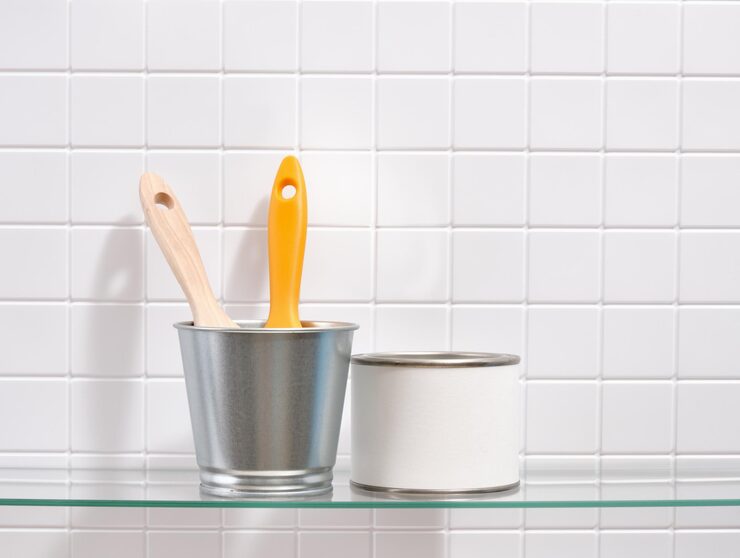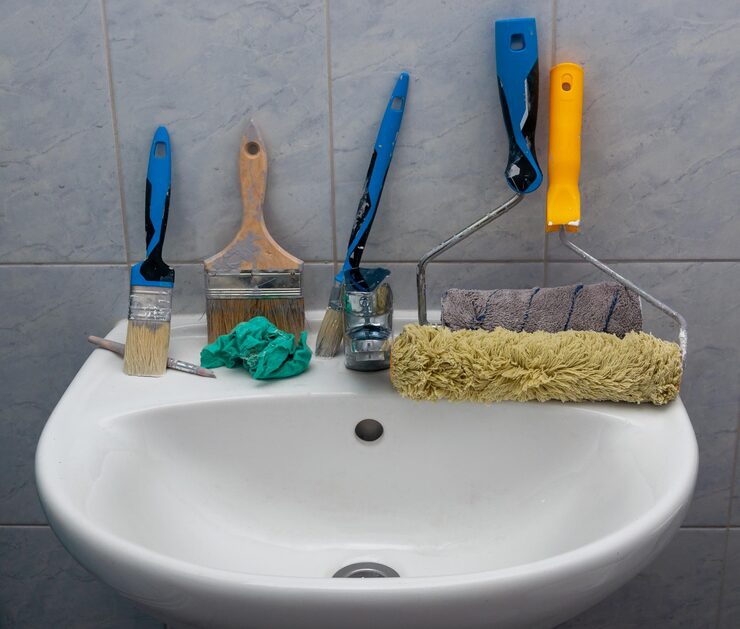- Free Estimates

Cleaning up after a painting project seems simple—just rinse the brushes and move on. But many wonder: can you wash paint brushes in the sink without causing damage or breaking any rules? The truth is, what goes down the drain can affect more than just plumbing—it impacts the environment, the home’s infrastructure, and even local regulations.
Here are six things everyone should know before turning on the faucet.
✔ Never wash paint brushes in the sink, as it can harm plumbing and the environment.
✔ Latex paint still contains chemicals that shouldn’t go down household drains.
✔ Oil-based paint cleanup requires special handling and should never involve a sink.
✔ Even small amounts of paint rinse water can damage septic systems or pipes.
✔ Use rinse buckets, outdoor cleaning stations, or paint hardeners for safer cleanup.
✔ Always let rinse water settle and dispose of solids in the trash, not the drain.
✔ Local hazardous waste facilities accept leftover paint and solvent-contaminated water.
✔ When in doubt, hire professionals who follow proper brush cleaning and disposal methods.

Many assume that running a brush under the tap is harmless. But whether it’s leftover latex or oil-based paint, rinsing it down the sink can cause real problems. Before anyone asks, can you wash paint brushes in the sink, it’s worth understanding where that waste ends up.
Different kinds of paint have different ingredients, and each reacts differently in drains. Before assuming it’s fine, it’s important to ask: can you wash latex paint brushes in the sink or are there better options?
While some areas remain quiet about household paint disposal, many towns and cities have clear laws against rinsing paint into indoor drains. Breaking those rules—even unknowingly—can lead to fines or environmental violations.
When you wash paint brushes in the sink, the impact extends far beyond plumbing problems. The chemicals in paint are harmful to the environment and can have long-lasting effects on wildlife and ecosystems.
With the painting services market projected to reach USD 93 billion by 2031, more homeowners are using latex paint for projects. However, this also introduces the risk of going into harmful paint cleanups. Instead of rinsing latex paint brushes in the sink, there are safer, more responsible ways to handle the mess. Here’s how to clean up thoroughly without causing plumbing or environmental problems.
Start by filling a medium-sized bucket with warm water to loosen the paint on the brush. Swirl the brush gently for a minute or two to release excess paint. This keeps latex particles out of the drain and eliminates the need to ask, can you wash latex paint brushes in the sink.
A stiff wire brush or painter’s comb helps remove clumps stuck deep in the bristles. Run the tool downward, away from the ferrule, to avoid damaging the brush. It’s a simple method that works better than relying on a sink rinse and makes brushes last longer.
After the initial rinse, transfer the brush to a fresh bucket of water to finish the cleaning. This two-bucket method ensures all paint is removed while keeping rinse water and sludge contained. Skipping the sink altogether answers the question: can you rinse paint brushes in the sink with a clear “no need.”
Not everyone has the time, tools, or space to clean up paint correctly. Professional painters and contractors follow strict disposal guidelines and know exactly how to clean latex paint brushes without using the sink. When unsure, it’s always better to hire someone who won’t cut corners—or clog a pipe.

Using a drain screen might catch larger debris, but it doesn’t stop paint particles, pigments, or chemical residue from entering the water system. Water-based and oil-based paints contain compounds that dissolve or suspend in water, slipping right past most filters. Even latex paints, though labeled as water-cleanable, still pose a risk when rinse water is sent through plumbing. So, can you wash paint brushes in the sink even with a screen? The short answer is no—it’s still not a safe or recommended method.
Commercial or industrial facilities may have specialized filtration systems that separate solids from liquids before discharge, but residential plumbing is not designed for that. Whether it’s a high-end home or a small apartment, paint particles can still cling to pipes or pass through to septic tanks. This is true even when cleaning latex brushes, which often leads people to ask can you wash latex paint brushes in the sink without realizing the long-term plumbing damage. Unless the plumbing was specifically built for paint disposal, it’s never safe to rinse brushes this way.
Hot water can loosen paint, especially latex, making cleanup easier—but it doesn’t solve the core problem. Paint particles don’t just dissolve; they remain suspended in water and end up traveling through pipes and into treatment systems unequipped to process them. Whether hot or cold, water used for cleaning brushes still carries chemicals that don’t belong in household drains. So even with hot water, the answer to can you wash paint brushes in the sink remains a firm no.
While it might seem like a shower or tub has more space and better drainage, these systems are no better equipped to handle paint. Paint can coat the tub, discolor surfaces, and lead to plumbing problems just like a kitchen sink would. Hair traps and wide drains don’t prevent pigments or chemicals from entering the pipes. Whether it’s a bathtub, utility sink, or shower, the question isn’t where to wash paint brushes indoors—it’s how to keep paint out of drains entirely.
At Avon Professional House Painter, we bring precision, care, and decades of experience to every brushstroke. From flawless interior touch-ups to full exterior transformations, our team delivers detailed, dependable painting solutions that stand up to Avon, CT’s changing seasons. We follow strict disposal practices, never rinsing paint brushes in the sink or risking your plumbing, and always respecting your home as if it were our own.
Let us bring your vision to life—on time, on budget, and with results you’ll be proud of. Contact us today!